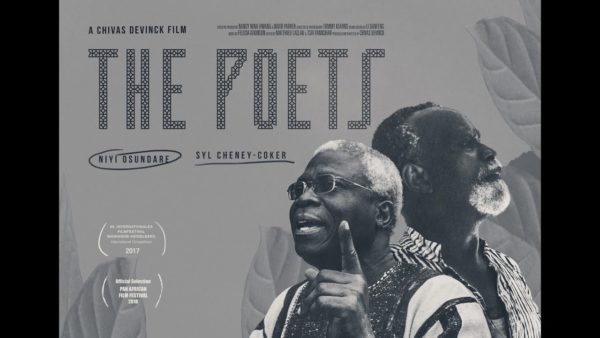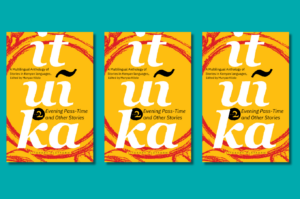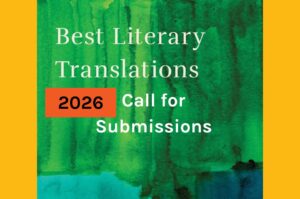The Poets, a new documentary film, celebrates the friendship between the Nigerian poet Niyi Osundare and the Sierra Leonean poet Syl Cheney-Coker. It is directed by New York-based filmmaker Chivas DeVinck and distributed by Icarus Films.
Here is a synopsis on YouTube.
The Poets is a documentary that follows two acclaimed West African poets, and lifelong friends, Syl Cheney-Coker and Niyi Osundare, as they travel through their home countries of Sierra Leone and Nigeria to explore what has shaped their art. As the film unfurls, they find answers all around them; in the stunning landscapes, the culture, the history, political strife, terrible tragedies, their family homes, and their friendship. Weaved with the poetry of Cheney-Coker and Osundare, The Poets is an exploration of how art is shaped by life experiences, and of the power and urgency of art in the face of political adversity.
Niyi Osundare, born 1947, is also a dramatist and literary critic. He received degrees from the University of Ibadan, the University of Leeds, and York University, Canada. He has been a professor and Head of English at the University of Ibadan and a professor of English at the University of New Orleans. He is the author of 19 books, including: The Eye of the Earth, which won the 1986 Commonwealth Poetry Prize; Waiting Laughters, winner of the 1990 Noma Award; and most recently, in 2011, City Without People: The Katrina Poems and Random Blues. He received the Kwanza Award in 1991 and the Fonlon/Nichols Prize from the African Literature Association in 1998. In 2014, he was awarded the Nigerian National Merit Award (NNMA), the country’s highest award for academic excellence.
Osundare is noted for his advocacy for free speech and commitment to socially relevant art. In Nigeria, he has written critical open letters to different Heads of State, most notably the dictator Sani Abacha and President Olusegun Obasanjo. The Niyi Osundare International Poetry Festival in Nigeria is held in his honour.

Syl Cheney-Coker, born 1945, is also a novelist and journalist. He attended the University of California, Los Angeles, the University of Oregon, and the University of Wisconsin–Madison. He has taught at the University of the Philippines and at the University of Maiduguri, Nigeria, and has been Writer-in-Residence at the University of Iowa, USA. His books include: The Road to Jamaica (1969), Concerto for an Exile: Poems (1973), The Graveyard Also Has Teeth (1980), The Blood in the Desert’s Eyes: Poems (1990), and his debut novel The Last Harmattan of Alusine Dunbar, which won the Commonwealth Writers’ Prize (Africa Region) in 1991.
While editing The Vanguard in Sierra Leone, the country’ 1997 coup meant he became targeted as a dissident and had to flee to the USA, where he became the first writer in the City of Asylum program in Las Vegas, Nevada. He eventually returned in 2003.
The documentary film has a positive review on Africa Is a Country:
The film . . . is a beautifully shot, spontaneous and lyrical journey down memory lane in the most literal sense possible. Director DeVinck brings together two prolific poets from West Africa and sends them off on nostalgic trips in their respective countries; Freetown for Cheney-Coker and Ikeri-Ekiti and Ibadan for Osundare. The documentary’s structure is deceptively straightforward and very well thought out. Symmetrically divided into two with the first half of the journey unfolding in Sierra Leone with Cheney-Coker as the interlocutor and then the second half with Osundare taking us through several parts of Nigeria, The Poets makes very particular, decisive stops.
Borrowing from the structure of a Künstlerroman, the type of novel that explores an artist’s formative years and eventual coming to maturity, the documentary forces the two poets to return to their childhood homes, their schools and their universities. Along the way, impactful political traumas are also explored with short bursts of archival footage; the Sierra Leonian civil war, military rule in Nigeria and Hurricane Katrina are some of the examples. Not to be forgotten is the true protagonist of this documentary: poetry. Ever so frequently, both poets read evocatively as the camera pans across various related and unrelated imagery. The poems are simultaneously inscribed in the poets’ own handwritings onto the screen thus making this documentary a richly layered, intertextual and intermedial experience.
Read the full review.









Joseph Ndukwu July 17, 2018 07:56
How do we get the documentary?